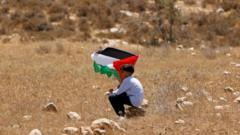Will Palestinian Recognition in the West Bank Lead to Israeli Annexation Fears?

Published: 2025-09-21 05:05:12 | Category: technology
This article explores the recent tensions surrounding the recognition of a Palestinian state, particularly in light of the tragic events in Jenin, where a 13-year-old boy was shot by Israeli forces. It examines the complex relationship between Israel and the Palestinian Authority, the implications of international recognition, and the ongoing struggles faced by Palestinian families and communities in the West Bank.
Last updated: 24 October 2023 (BST)
Key Takeaways
- The shooting of 13-year-old Islam Majarmeh highlights the ongoing violence in the West Bank.
- Recent statements from UK and France suggest a shift towards recognising a Palestinian state.
- Jenin's mayor claims significant portions of the city are under Israeli military control.
- Settlement expansion continues to exacerbate tensions and displace Palestinian residents.
- The Palestinian Authority faces challenges in governance and service provision amid Israeli restrictions.
- Recognition of a Palestinian state may reshape international engagement in the region.
The Tragic Death of a Young Boy
Abdel Aziz Majarmeh's heart-wrenching account of his son Islam's death reveals the harsh realities faced by Palestinian families. As he stood next to his son during the shooting, his grief compounded by the overwhelming sense of helplessness against an occupying force. "Why are you shooting children?" he lamented, echoing the sentiments of many parents in conflict zones.
The Israeli military stated that the shooting was in response to a perceived threat, yet the circumstances remain unclear. This tragic incident is not an isolated event but a reflection of the broader conflict and the fragility of life in the occupied territories.
The Context of Israeli-Palestinian Relations
After the Oslo Peace Accords were signed in the 1990s, Palestinian territories were expected to serve as the foundation for a future state. However, the reality has been starkly different. Israeli military operations in Jenin and Tulkarem have intensified, with the government citing security concerns over rising armed groups. Residents now live under constant surveillance and military presence, contributing to a climate of fear and instability.
Israeli Military Operations and Their Impact
The Israeli military's ongoing presence in Jenin has led to significant changes in the local landscape. Mayor Mohammed Jarrar reported that 40% of the city is now classified as a military area, forcing residents to flee their homes. The destruction of buildings and infrastructure has left many without basic services, leading to a humanitarian crisis.
The Role of the Palestinian Authority
The Palestinian Authority (PA) finds itself in a precarious position, unable to protect its citizens or maintain control over its territories. With Israel withholding tax revenues, the PA struggles to provide essential services. The recent decision to eliminate financial compensation for families of Palestinian militants further complicates the situation, as public services crumble under the weight of economic restrictions.
As the PA grapples with these challenges, its authority is increasingly questioned by the population. Residents express feelings of abandonment and powerlessness, as they look to a government that seems unable to shield them from violence.
International Recognition: A Double-Edged Sword
The potential recognition of a Palestinian state by nations like the UK and France comes at a critical juncture. This recognition may reinforce the notion that Palestinians have a legitimate claim to statehood, even under occupation. However, as Mayor Jarrar pointed out, such recognition could paradoxically lead to greater Israeli control over the West Bank, as the Israeli government pushes back against any moves that threaten its claims to the land.
Israeli Settlements: A Growing Challenge
Israeli settlements in the West Bank continue to expand, often resulting in the displacement of Palestinian families. Ayman Soufan's experiences illustrate the day-to-day realities of living under threat from nearby settlers, who occupy land and intimidate local communities. The government's support for these settlements, despite their illegality under international law, underscores the shift towards a more hardline stance on territorial claims.
Human Rights Concerns
Human rights organisations have raised alarms about the increasing violence and intimidation faced by Palestinians from settlers and the military. The situation is compounded by a lack of accountability, as many victims feel that their grievances go unheard. The cycle of violence perpetuates a culture of fear, making it difficult for families to envision a peaceful future.
The Future of Palestinian Statehood
The struggle for Palestinian statehood is intertwined with the broader geopolitical landscape. As the Gaza conflict continues to evolve, so too does the international community's response. Countries like the UK and France are signalling a willingness to engage with Palestinian aspirations, yet the reality on the ground remains complex.
Israeli Prime Minister Benjamin Netanyahu's commitment to preventing a Palestinian state reflects a long-standing policy that prioritises Israeli security and territorial claims. The rhetoric from Israeli officials suggests a deepening divide between Israel and its European allies, as recognition of Palestinian statehood represents a challenge to Israeli narratives about sovereignty and security.
What Lies Ahead?
The ongoing conflict raises critical questions about the future of both Israelis and Palestinians. As tensions flare, the potential for dialogue and negotiation appears dim. However, the recognition of a Palestinian state may serve as a catalyst for renewed discussions about peace and coexistence. The international community's role in this process will be vital, as it navigates the delicate balance between supporting Palestinian rights and addressing Israeli security concerns.
FAQs
What triggered the recent violence in Jenin?
The violence in Jenin was exacerbated by Israeli military operations aimed at curbing armed groups. The tragic shooting of 13-year-old Islam Majarmeh highlighted the risks faced by civilians in conflict areas.
What is the significance of international recognition of a Palestinian state?
International recognition of a Palestinian state underscores the legitimacy of Palestinian claims to sovereignty and statehood, even amid ongoing occupation, impacting diplomatic relations and negotiations.
How do Israeli settlements affect Palestinian communities?
Israeli settlements lead to the displacement of Palestinian families, increased violence, and restrictions on movement, further entrenching the division between communities and undermining prospects for peace.
What challenges does the Palestinian Authority face?
The Palestinian Authority struggles with limited resources, lack of control over its territories, and rising discontent among its populace, complicating its ability to govern effectively.
What are the implications of the Gaza conflict for the West Bank?
The Gaza conflict complicates the situation in the West Bank by intensifying calls for Palestinian statehood while simultaneously heightening Israeli security measures and military presence.
The path to peace remains fraught with challenges, as the recognition of a Palestinian state may both empower and complicate the situation. How will the international community navigate these treacherous waters moving forward? #PalestinianRights #IsraeliSettlements #MiddleEastPeace



